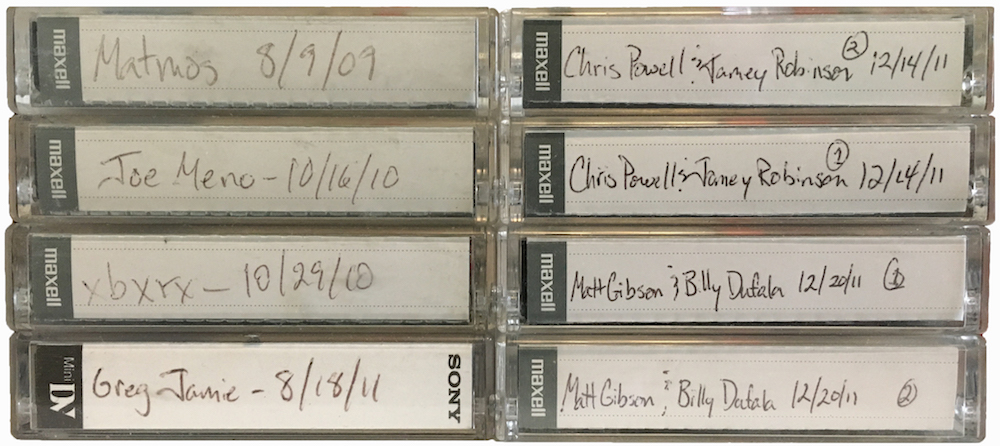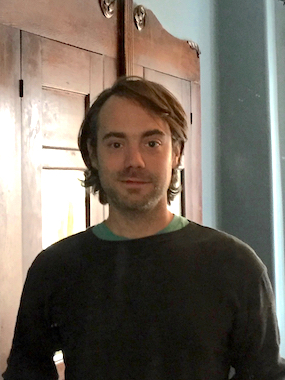Video Feature by John Vogel
A Decade of Change for Independent Musicians
Ten years ago, I started collecting interviews for a project about creative motivation. I had no clear idea in mind when I began, but wanted to elucidate why people continue to pursue art, especially when monetary and status benefits are extremely limited. The outcome of this project was unknown both to the interviewees and to me.
Beginning in the summer of 2009, I did video interviews sporadically for two years while living in Philadelphia and touring the country playing keyboards and trumpet in the band Grandchildren. Three of these interviews were conducted in Philadelphia; two in Los Angeles; and the others in Baltimore, New York City, Chicago, and Portland, Maine.
Once I’d completed the interviews, I ended up weaving the clips into the multimedia project that became Weird Music. I played each section live for audiences as I finished it, and on August 9, 2019—the tenth anniversary of the day I collected the first two interviews with Drew Daniel and Martin Schmidt of Matmos and Ches Smith—I performed the last section for the first time. Considering the decade that's elapsed, I was struck by the many people at that show who commented on how “now” the project seemed.
Growing up, I avoided paying full price for CDs by copying music from friends and combing through secondhand stores. I still use the library as a source for free music. Because of its larger reach, web-based access can seem threatening to the livelihoods of artists, but I often wonder how much impact it really has.
After all, media technology oscillates between favoring expert producers with expensive equipment and encouraging amateur production. In the early days, you could record on a phonograph. Not so long ago, duplicating cassettes and VHS was cheap and easy, leading to our beloved mix tapes and four-track artists.
As Drew Daniel says at the end of this piece, “If you’re fundamentally a consumer, then you win, and that’s great for you. But if you’re fundamentally a creator…, we slide back a few steps with this model.” I wouldn’t separate people into distinct groups of performers and spectators, though. Maybe it's just because a lot of the people I know are artists, but I find it hard to believe that most are only consumers and don't participate in creating something.
During my performances of Weird Music, these interviews are projected behind me with two TVs on either side running attribution, transcription of the interviews, and auxiliary footage while I play music. The final version of this project will be a music video using televisions to display the interviews in settings that physically address the content in four parts: (1) the telepathic aspects of art, (2) the differences between recording and live performance, (3) our digital transition, and (4) money balance.
In my 2014 TW feature “What If You’re Not Shakespeare or Jay Z?,” I compiled a text version of Weird Music's last section, which concentrates on the issue of money and creative work. But the digital transition is connected to that topic, too, and preoccupied many of the interviewees. Shifting from physical media to digital distribution has had a direct influence on artistic finances and the role that the arts play in our lives.
In this video feature for Talking Writing, the focus is on our digital transition. The edited interviews address the many losses musicians and other artists have experienced over the past decade.

The Interviews
- Drew Daniel and Martin Schmidt from Matmos at their house in Baltimore on August 9, 2009.
- Joe Meno, author of Hairstyles of the Damned and The Great Perhaps, at Lovely Kitchen and Café in Chicago on October 16, 2010. (Production note: When charging the camera battery the night before this interview, I didn't plug in the battery all the way, and it died two minutes into recording. In this feature, I've run the sound recording over additional footage.)
- Vice Cooler and Steve Touchstone from XBXRX at Cooler's house in Los Angeles on October 29, 2010.
- Greg Jamie from O'Death at his house and venue, The Oak and the Ax, in Portland, Maine, on August 18, 2011.
- Jamey Robinson of Need New Body; Buffalo Stance, formerly of Man Man; and Chris Powell of Need New Body, Spaceship Aloha, and Man Man at Robinson's house in Philadelphia on December 14, 2011.
- Matt Gibson and Billy Dufala, formerly of Man Man, at Dufala's studio in Philadelphia on December 20, 2011.
 John Vogel is the production editor of Talking Writing. Besides working, writing, and making music, John spends his time chasing around a one-and-a-half-year-old. He's tired. He lives in Philadelphia with his wife and the aforementioned toddler.
John Vogel is the production editor of Talking Writing. Besides working, writing, and making music, John spends his time chasing around a one-and-a-half-year-old. He's tired. He lives in Philadelphia with his wife and the aforementioned toddler.
For other excerpts from some of these interviews and his musical work, please visit John Vogel's Vimeo page and Eddie Sids's Vimeo page.
